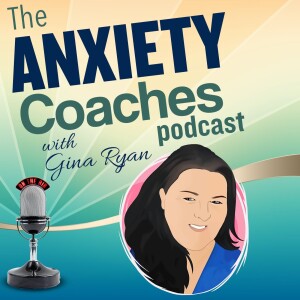
1018: The Gut-Brain Connection: How Stress Impacts Your Stomach
 2024-04-03
2024-04-03
In today's episode, Gina discusses a listener question about anxiety and stomach issues. Stress can have a major impact on our bodies and the functioning of the stomach in particular. Listen in to better understand why your stomach related symptoms occur and how to heal from these distressing effects of anxiety.
Please visit our Sponsor Page to find all the links and codes for our awesome sponsors!
https://www.theanxietycoachespodcast.com/sponsors/
Thank you for supporting The Anxiety Coaches Podcast.
FREE MUST-HAVE RESOURCE FOR Calming Your Anxious Mind
10-Minute Body-Scan Meditation for Anxiety
Anxiety Coaches Podcast Group Coaching link
ACPGroupCoaching.com
To learn more, go to:
Website https://www.theanxietycoachespodcast.com
Join our Group Coaching Full or Mini Membership Program
Learn more about our One-on-One Coaching
What is anxiety?
Find even more peace and calm with our Supercast premium access membership:
For $5 a month, all episodes are ad-free! https://anxietycoaches.supercast.com/
Here's what's included for $5/month:
❤ New Ad-Free episodes every Sunday and Wednesday
❤ Access to the entire Ad-free back-catalog with over 600 episodes
❤ Premium meditations recorded with you in mind
❤ And more fun surprises along the way!
All this in your favorite podcast app!
Quote:
The nervous system controls and coordinates all organs and structures of the human body.
-Gray's Anatomy
Chapters0:23 Introduction
7:52 The Gut-Brain Connection
11:23 Short-Term Recovery
13:08 Long-Term Healing Considerations
17:20 Continuous Self-Care and Stress Management
SummaryIn this episode of the Anxiety Coaches Podcast, we delve into the fascinating topic of the gut-brain connection and how stress impacts our stomach. Stress triggers the body's fight or flight response, releasing hormones like cortisol and adrenaline, which can affect digestion by reducing blood flow, increasing stomach acid production, altering gut motility, and disrupting the gut microbiome. The body diverts blood flow away from the stomach during stress to prioritize essential functions for survival.
The gut-brain axis plays a crucial role in connecting the central nervous system with the gut's enteric nervous system, influencing gut function through pathways like the vagus nerve and neurotransmitter release. Emotion-induced responses such as anxiety and stress can affect gut function, highlighting the intricate connection between mental health and digestion. The enteric nervous system acts as a second brain within the digestive system, controlling gastrointestinal functions and interacting with the central nervous system for overall health and wellbeing.
When it comes to healing after psychological stress, factors like stress duration, intensity, individual resilience, and coping mechanisms play a significant role. Short-term recovery can occur rapidly once the stressor is managed, while long-term healing from chronic stress may require engaging in stress-reducing activities, seeking therapy or counseling, adopting a healthy lifestyle, and practicing self-care consistently. Healing timelines vary from person to person, emphasizing the importance of individual variability and continuous self-care even after immediate stress effects have subsided.
By making healthy lifestyle changes, practicing stress management techniques, and prioritizing self-care, individuals can navigate through chronic stress and promote long-lasting well-being. It's essential to be proactive in maintaining a supportive environment for the mind and body to relax and heal. Remember, healing takes time, so be patient with yourself and embrace the journey towards a calmer, healthier state of being. Join me in exploring more topics in upcoming episodes, and feel free to share your questions or thoughts with me via email. Until next time, take care and aloha.
Learn more about your ad choices. Visit megaphone.fm/adchoices
More Episodes
Create your
podcast in
minutes
- Full-featured podcast site
- Unlimited storage and bandwidth
- Comprehensive podcast stats
- Distribute to Apple Podcasts, Spotify, and more
- Make money with your podcast
It is Free
- Privacy Policy
- Cookie Policy
- Terms of Use
- Consent Preferences
- Copyright © 2015-2024 Podbean.com



